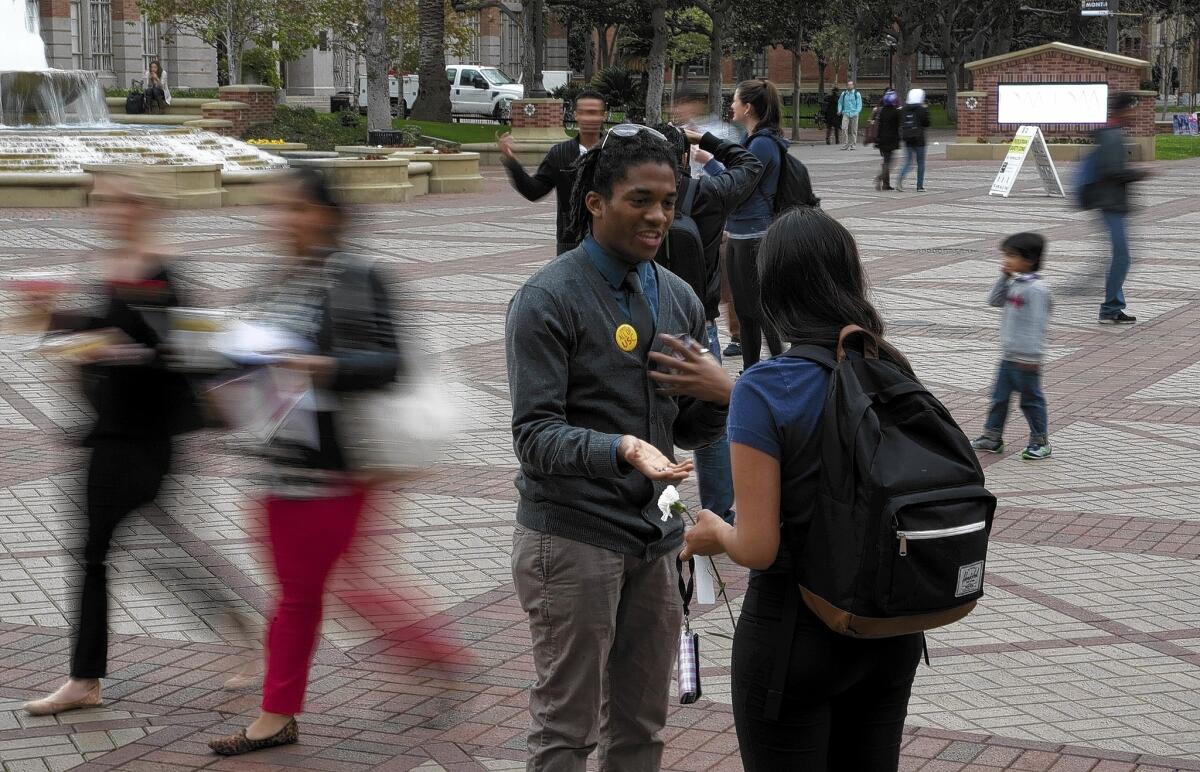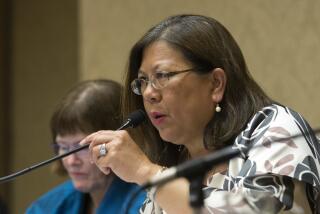In USC student government, where are the women?

James White hesitated before deciding to run for USC student body president, knowing he’d be a long shot because of his background.
Because he’s black?
“No, not that,” White said, adding that race isn’t the biggest deal in campus presidential elections. “It’s other forms of diversity that aren’t appreciated.”
FOR THE RECORD: An earlier version of this article said that USC student government presidential candidates have been exclusively male since 2005. That is the case since 2006.
White was referring to this: Only a few presidents have been racial minorities since 2006, but almost all have been part of a Greek organization, and every single one has been male. There hasn’t even been a female presidential candidate during that time.
Although it’s not unusual for fraternity members to hold high positions in student government at big campuses, it’s almost unheard of for women not to be elected, much less not try. At UCLA, there have been six women presidents since 2005.
Worried that their organization was becoming a version of Los Angeles City Hall, where there’s only one female councilwoman, student leaders at USC began last year to recruit more diverse candidates for this election cycle. But to the chagrin of some alumni and students, White was the only non-Greek presidential candidate on the ballot, and no women ran for the top job.
“If not even one woman has run in eight years, there’s a problem there,” said Jessica Lall, the last woman president. “In fact, it’s appalling.”
Aside from being an eye-catching item on a resume, the USC student president job includes overseeing four branches of student government, appointing staff and having an influence on a nearly $1.8-million budget.
But White said he never before considered running. Unlike many other student politicians, he wasn’t involved in the student government at his high school in Truro, Iowa, because he thought all it did was “organize dances.”
When he came to USC, he joined almost by accident. Determined to maximize his college experience, White signed up for so many student clubs and activities the first week, he didn’t realize he was volunteering for student government.
“But when I started going, I really liked it,” he said.
One activity White wasn’t interested in was fraternities. He said that with eight siblings, “I know what it’s like to have a brother.” White, who works at an Applebee’s restaurant and a Gap clothing store during breaks, said he also didn’t want to pay Greek dues.
He worked on a student presidential campaign last year and he said he was repeatedly asked to run.
White, a junior majoring in political science and policy, planning and development, knew he faced an uphill battle: About 18% of USC undergraduates are in the Greek system, and “they’re the easiest group to mobilize,” he said. Because voter turnout is generally low, support from fraternities and sororities is crucial.
Like any savvy politician, White tried to balance his ticket. He asked Brigid Kelly, a sophomore in student government with whom he’d worked in another campus organization, to be his running mate. She also is a member of Delta Gamma.
But they knew Kelly’s background would be trumped by other candidates’ fraternity ties. Women typically participate in formal recruitment to Greek organizations in the fall, but men can rush during the fall and the spring, which coincides with the election season.
So, like a Democratic presidential hopeful in a blue state, USC fraternity brothers have the upper hand, some say. They enjoy a bigger base of volunteers to pass out fliers, hang signs and raise awareness. “Remember, pledges, be enthusiastic,” one student told a group of guys at a recent debate.
Competition for the presidency is fierce. Hopefuls spend weeks meeting with student groups to win endorsements, recruit campaign staffs and set up professional-looking websites with videos. They also must obey campaign rules that are sensible (there’s a $1,500 spending cap) and arcane (all campaign materials must have the slogan “Vote on”).
White’s long odds were apparent at a recent debate. Nineteen students wore red T-shirts supporting Logan Heley, a member of the Sigma Nu fraternity and current Greek senator. Twenty-four people wore white shirts in favor of Andrew Menard, who serves in student government and is the social chair of Sigma Chi.
There were only two people wearing shirts from White’s campaign.
Menard said that Greek candidates do have an advantage, but that he wanted his ticket to reflect USC’s diversity, which is part of the reason he approached Rini Sampath, a non-Greek, to be his running mate. “You want your student leaders to reflect your student body,” he said.
After loud cheers for one of his opponents, White said, “Shout out to Sigma Chi. You guys rolled out deep today.”
As he straightened some of his off-kilter campaign signs on a grassy island near the Tommy Trojan statue last week, White sighed. “It’s just a little lonely sometimes,” he said. “Last week, I was out here alone and there were Sigma Chi pledges to my right and Sigma Nu to my left.”
Last year, all the presidential and vice presidential candidates were fraternity members. The current tickets are more diverse: Two of the vice presidential candidates are not fraternity or sorority members, and Sampath was born in India. There’s also a write-in team whose members are not in the Greek system.
Heley said he was puzzled that women haven’t run, but said diversity goes beyond gender and race. He and his running mate have prioritized issues such as preventing sexual assault because “we want to make the campus better for everyone, not just one group,” Heley said.
It’s unclear why women don’t run, especially since they are fairly well represented in USC’s student government. Former president Lall said the lack of women has become a self-fulfilling prophecy — many students automatically believe females can’t win. She said she asked a male to be her vice presidential candidate and he agreed. But during winter break, he called her and said he should be at the top of the ticket.
Lall, now the executive director for the South Park Business Improvement District, said that when she asked him why he changed his mind, he replied: “When was the last time a woman won?”
“It was a big slap in the face,” said Lall, who picked a different running mate.
Lall participated in a recent event at USC urging female students to run for elected office, but none decided to seek the top job.
Both current female vice presidential candidates said they will continue to be involved in politics, win or lose, but stopped just shy of saying they would run again.
As of last week, Kelly was still busy trying to get all the votes she could. She and White met on the final day of polling to hand out fliers and greet passing students.
“When you’re in my position, you’ve got to make sure everything is personal and people make a connection to you,” White said. “It’s our best hope.”
Election results will be announced Tuesday.
More to Read
Start your day right
Sign up for Essential California for news, features and recommendations from the L.A. Times and beyond in your inbox six days a week.
You may occasionally receive promotional content from the Los Angeles Times.







